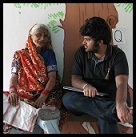First time in Rural India: Part 1 (Samarth, GM'13)
Contributor: Samarth Bansal
I had never stayed in an Indian village, and neither had any concrete idea about them apart from what had been conveyed by literature and cinema. Gramya Manthan provided me an opportunity for the same, in which I visited villages in Kanpur Dehat. Certainly, I will attribute that this took place in a controlled environment (for it was not just a random visit, rather was as a part of a programme), but with opportunities of limitless exploration, it was easy to break the barriers of the same. Ah, this was not an ordinary experience.
Part-1 : Disconnect, Handicap and Pessimism
There can never be a substitute for experiential learning. Getting into the shoes of villagers, though for a day, is a decent attempt to get a hint of rural life. We landed in village Tishti, and had a stay with one of the families. Ah, this was not an ordinary day for me.
Silent it was. I was sipping ginger tea, pinkish-brown in colour, an unfamiliar air was around. Half an hour later, I was served with besan-potato curry, chapatti and rice. I had no words. The silence disturbed me. I almost cried at heart. It made me think. All this, and lots more, came sitting on the Charpai of the rural-family allotted to me, to stay along for a day. Manoj ji was the head of the family. He was at work, and the family members told me that he was the popular Halwai of the village.
There was a certain disconnect that I could sense being there, the reason for which is not very difficult to guess. A boy for whom Delhi synonymised India, a firsthand experience in rural India was bound to bring out that. I did initiate certain conversations being there, but they couldn’t last long. After an hour and half, with loads of questions at heart, I moved back to Kilkari Learning Center(at Shastri Ji’s School), where the organizing team was staying.
Isn’t it surprising how my homestay in Japan during a cultural exchange programme made me feel how cultures across country, even with language barriers, connect beautifully. And here, within the space of my own nation, I saw that missing. Empathy lacked. I was curious why so. I need to figure out the parameters that result in a better human bond. I felt less Indian. Anyway, Shefali(co-founder Youth Alliance) encouraged me to move back.
And I had to. So rather, I went to the sweet shop where the family head used to work. My friend was also there, for he was residing at the residence of the sweet shop owner. Things started getting easier there. And I felt handicapped. I actually needed someone along to feel normal and comfortable. This is not what I had expected out of myself. Manoj Ji very enthusiastically talked for around 10 minutes, and said that he would take us to his family farms in the evening. I was excited. I had a great time with the kids around : Sakshi, Khushi, Gopal Ji, Bhagwan Ji and Mansi.
Next, I went exploring the village, talking to the doctor in the Govt Hospital, ex-Pradhan and the Grameen Bank manager. These interactions were dominated by pessimism, where people had all sorts of reasons to justify why change can’t happen. Quoting an unemployed graduate : “Bhaisahab, kuch nahi ho sakta is jagah ka. Logon ki buddhi bhrasht hai. Kuch bhi kar lo, par inka dimaag waise ka waise hi rahega.” These conversations reflected frustration and helplessness. And I think one should be sensible enough to filter them out. If people would have stopped based on such statements, India would have never been an independent country. This difference in attitude is what makes the change-makers stand apart from the rest.
Anyway, I was back at the stall in the evening. They welcomed me with a generous smile. I was constantly looking towards Manoj Ji, for he said he would take me to the farms. But he was working, and working, and working. I thought he forgot. I stayed. I asked if I should move to his home. Manoj Ji said, “Aap yahan rukiye. Saath hi ghar chalenge.” Yeah, I decided to(as planned) stay at Manoj Ji’s house. I wanted to share everything I had experienced that day with him. I thought that we’ll remain awake for quite long, talk about village life and have fun.
Now, it was 11pm. The shop owner asked him to be at the stall at 4am in morning. I was like, seriously? Manoj Ji had been working since morning till late night continuously, and then again, he was asked to turn up so early. Where on the earth is this justified? I was shocked. I realized he would need rest. So, we’ll go to his home and just sleep. Even that would be okay. But then he said something that shook me : “Kya aap maalik ke ghar pe ruk jayenge?” Earlier, I overheard the shop owner asking Manoj Ji if he had space in his house for me to stay. Then, he replied with an affirmative. Why did he change now? I was in a fix. It was not that I didn’t have any place to stay. I wanted to be at his place. I considered his family as mine. I said he need not worry. I’ll go to Kilkari and stay for the night.
On the way, I asked about their extensive timing. “Majboori hai humari”, he said. “Do din ki naukri hai. Teesre din pata nahi kaam mile ya na mile. Poore paise lene ke liye dinbhar mehnat karni padti hai. Agar koi bada order aa jaye, to shayad maalik rakh le”. Yes, he was a daily wage laborer. And farming was an alternative source of livelihood for him.
I had nothing to stay. I went back to Kilkari, and slept.

.jpg)
Comments
Post a Comment